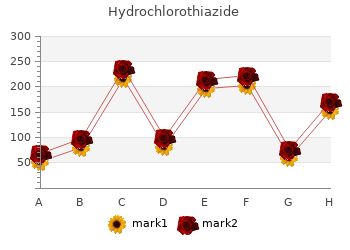2018, Lutheran Theological Seminary at Gettysburg, Kaffu's review: "Hydrochlorothiazide 25 mg, 12.5 mg. Only $0,23 per pill. Proven Hydrochlorothiazide online no RX.".
It is the leading cause of premature death in Canada—about 1 generic 25 mg hydrochlorothiazide overnight delivery,006 buy 25mg hydrochlorothiazide free shipping,000 potential years were lost in 2003 as a result of cancer discount 12.5mg hydrochlorothiazide free shipping. Cancer has become an age-related phenomenon: 44 percent of new cancer cases and 60 percent of cancer deaths will occur among those who are at least 70 years old. Rather, in many cases it is generally thought that our lifetime exposure to factors that increase our risk, such as smoking or eating a poor diet, leads to the development of cancer. Our bodies are made up of millions of cells grouped together to form tissues or organs, such as muscles, skin, bones, and organs. Cancer occurs when there is an abnormal growth of cells, which can form lumps or tumours, or can spread through the bloodstream and lymphatic system to other parts of the body. Benign tumour cells stay in one place in the body and are not usually life-threatening. Malignant tumour cells are able to spread to invade nearby tissues and other parts of the body, which is a process called metastasis. Finding cancer early and getting treat- ment before it spreads can greatly help improve your chances of survival. While we think of cancer as one disease, it is actually a group of more than 100 different diseases. It can involve any tissue of the body and have many different forms in each body area. The four most common types of cancer in Canada are breast, prostate, lung, and colon. A great deal of research has focused on the underlying causes of abnormal cell growth. We do know that certain factors, such as free radical damage, genetics, diet, and lifestyle, are involved. While many of us may blame our family history, only about 5–10 percent of cancers are attributed to faulty genes. Having a family history may increase your risk of certain cancers, but researchers feel that whether or not those genes are “switched on” may depend largely on lifestyle and environment. These critical yet often overlooked factors play a role not only in prevention but also in the treatment and recovery from cancer. Based on current incidence rates, 39 percent of Canadian women will develop cancer during their lifetimes. Cancer is a very broad subject and it is beyond the scope of this chapter to discuss each type and make individualized recommendations. The goal here is to provide you with information on known risk factors for the most common forms of cancer, how to reduce your risk of getting cancer, and how to improve your chances of survival if 152 you have cancer. If you have been diagnosed with cancer, it is critical that you consult with your health care provider to create an individualized program. In many cases, dietary and lifestyle strategies and supplements can be taken along with your other treatments. Certain supplements, however, could interact with chemotherapy or other medical treatments, so it is important to work with your health care provider. Research shows that overall 30–35 percent of all cancers can be prevented by be- ing active, eating well, and maintaining a healthy body weight. It may take months or years before there are any signs or symptoms, and these symptoms can vary greatly depending on the location of the cancer. Some substances used in pesticides are classified as known, probable, or possible carcinogens. Exposure to many different risk factors may increase a person’s risk more than the risk associated with each individual toxin or chemical, so it is important to avoid as many known risk factors as possible. Researchers looked at a group of 44,778 pairs of twins from Finland, Sweden, and Denmark, in order to assess the risks of cancer for the twins of people with cancer. The researchers concluded that inherited genetic factors make only a minor contribution to the susceptibility of breast, prostate, and colorectal cancer. More importantly, they con- cluded that environmental factors make a major contribution to all of the 28 anatomi- cal sites of cancer studied (New England Journal of Medicine, 2000: 343; 78–85). Today there are numerous options for medical treat- ment including chemotherapy, radiation, surgery, and hormone therapy. For those who have cancer, a good nutritional program can help prevent weight loss, aid digestion, support immune function, and boost energy levels. Dietary Recommendations Foods to include: C • Boost fibre intake: aim for 25–30 g daily of soluble and insoluble fibre. Eat 2 tbsps of milled flaxseed every day: it provides fibre and contains compounds that help in the prevention of cancer. Foods that contain the highest amounts of pesticide residue include peaches, strawberries, apples, spinach, nectarines, celery, pears, cherries, potatoes, peppers, and raspberries. If organics are not available or cost-prohibi- tive, wash your produce with lots of water and scrub the skins. In 1992, a review of 200 studies showed that cancer risk in people consuming diets high in fruits and vegetables was only one-half that in those consuming few of these foods. It is clear that there are components in a plant-based diet that can reduce cancer risk, but few Canadians get the recommended intake of these foods (Nutrition and Cancer, 1992; 18 (1): 1–29). Avoid trans fats (found in many processed/snack foods and fried foods) completely. Heavy drinking increases the risk of cancers of the mouth, esophagus, breast, colorectal, and stomach.


Take a moment to summarize in Worksheet 2-4 what you believe are the most impor- tant origins and contributors to your depression or anxiety discount hydrochlorothiazide 12.5 mg fast delivery. Physical contributors (genetics cheap 12.5mg hydrochlorothiazide otc, drugs order hydrochlorothiazide 12.5mg on-line, illness): ________________________________________________________________________________ ________________________________________________________________________________ ________________________________________________________________________________ ________________________________________________________________________________ 2. My personal history: ________________________________________________________________________________ ________________________________________________________________________________ ________________________________________________________________________________ ________________________________________________________________________________ 3. The stressors in my world: ________________________________________________________________________________ ________________________________________________________________________________ ________________________________________________________________________________ ________________________________________________________________________________ As you review your summary, we sincerely hope you conclude that you’re truly not at fault for having depression or anxiety. At the same time, you’re responsible for doing something about your distress — no one can do the work for you. Just remember that working on your emotional distress rewards you with lifelong benefits. Chapter 3 Overcoming Obstacles to Change In This Chapter Uncovering change-blocking beliefs Busting beliefs Sleuthing self-sabotage Slicing through self-sabotage ou don’t want to feel depressed or anxious. You want to do something about your distress, but you may feel overwhelmed and incapable. But first, you have to understand and overcome the obstacles in your mind that prevent you from taking action and moving forward. In this chapter, we help you uncover assumptions or beliefs you may have that make it hard for you to tackle your problems. After you identify the beliefs that stand in your way, you can use a tool we provide to remove these obstacles from your path. We also help you dis- cover whether you’re unconsciously sabotaging your own progress. If you discover that you’re getting in your own way, we show you how to rewrite your self-defeating script. Discovering and Challenging Change-Blocking Beliefs You may not be aware that people hold many beliefs about change. Others think they don’t deserve to be happy and there- fore don’t change their lives to improve their situations. By stealing your motivation to change, assumptions such as these can keep you stuck in a depressed or anxious state. And, unfortunately, most people aren’t aware of when and how these underlying assump- tions can derail the most serious and sincere efforts for making changes. The quizzes in this section are designed to help you discover whether any change-blocking beliefs create obstacles on your road to change. After the quizzes, you can find an exercise that assists you in ridding yourself of these beliefs through careful, honest analysis of whether each belief helps or hurts you. Detecting beliefs standing in your way People resist change because they are afraid, feel they don’t deserve something better, and/or view themselves as helpless to do anything about their circumstances. Unknowingly holding any of these beliefs will inevitably impede your progress toward change. So take the following three quizzes to see which, if any, of these barriers exist in your mind. Put a check mark next to each statement in Worksheets 3-1, 3-2, and 3-3 that you feel applies to you. Part I: Analyzing Angst and Preparing a Plan 32 Worksheet 3-1 The Fear of Change Quiz ❏ 1. Doing something about my problems would somehow discount the importance of the trauma that has happened in my life. Now that you’ve taken the quizzes, you can probably see if any of these beliefs dwell in your mind. If you checked two or more items in The Fear of Change Quiz, you probably get scared at the thought of changing. If you checked two or more items from The Underlying Undeserving Belief Quiz, you may feel that you don’t deserve the good things that could come to you if you were to change. Chapter 3: Overcoming Obstacles to Change 33 If you checked two or more items from The Unfair, Unjust Belief Quiz, you may dwell so much on how you’re suffering that you have trouble marshalling the resources for making changes. If, by chance, you checked two or more items in two or more quizzes, well, you have a little work cut out for you. People pick up on these ideas as children or through traumatic events at any time in their lives. And some change- blocking beliefs have a touch of truth to them; for instance, Life is often unfair. You can succeed in the things you do, and you can move past the bad things that have happened to you. Even if you’ve experienced horrific trauma, moving on doesn’t diminish the significance of what you experienced. Lately, she’s been sleeping poorly; her youngest child has asthma, and Jasmine finds herself listening to the child’s breathing throughout the night. Her oldest son is an exchange student in another country and rarely calls home, so images of him being hurt or kidnapped float through Jasmine’s mind throughout the day. Her doctor is concerned about her rising blood pressure, so Jasmine decides to work on her anxiety and stress. She takes the three change-blocking beliefs quizzes (presented earlier in this section) and discovers a variety of change-blocking beliefs, although the fear and undeserv- ing beliefs predominate. She then fills in her Top Three Change-Blocking Beliefs Summary, which you can see in Worksheet 3-4. Next, Jasmine jots down her reflections on both this exercise and the change-blocking beliefs she’s identified in the summary (see Worksheet 3-5).
8 of 10 - Review by A. Osko
Votes: 63 votes
Total customer reviews: 63

